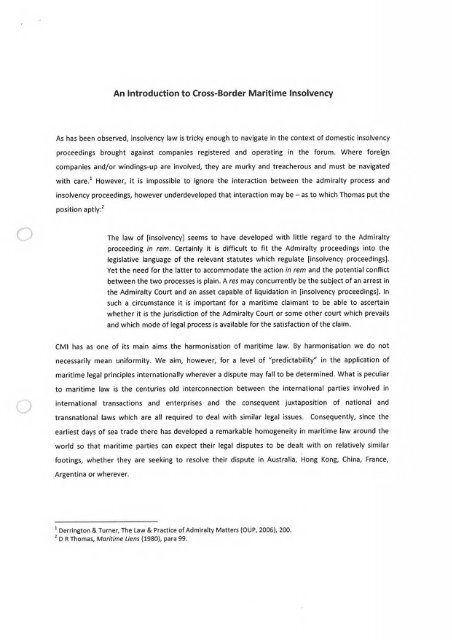COMITE MARITIME INTERNATIONAL
COMITE MARITIME INTERNATIONAL
COMITE MARITIME INTERNATIONAL
Create successful ePaper yourself
Turn your PDF publications into a flip-book with our unique Google optimized e-Paper software.
An Introduction to Cross-Border Maritime InsolvencyAs has been observed, insolvency law is tricky enough to navigate in the context of domestic insolvencyproceedings brought against companies registered and operating in the forum. Where foreigncompanies and/or windings-up are involved, they are murky and treacherous and must be navigatedwith care.' However, it is impossible to ignore the interaction between the admiralty process andinsolvency proceedings, however underdeveloped that interaction may be — as to which Thomas put theposition aptly: 2The law of [insolvency] seems to have developed with little regard to the Admiraltyproceeding in rem. Certainly it is difficult to fit the Admiralty proceedings into thelegislative language of the relevant statutes which regulate [insolvency proceedings].Yet the need for the latter to accommodate the action in rem and the potential conflictbetween the two processes is plain. A res may concurrently be the subject of an arrest inthe Admiralty Court and an asset capable of liquidation in [insolvency proceedings]. Insuch a circumstance it is important for a maritime claimant to be able to ascertainwhether it is the jurisdiction of the Admiralty Court or some other court which prevailsand which mode of legal process is available for the satisfaction of the claim.CMI has as one of its main aims the harmonisation of maritime law. By harmonisation we do notnecessarily mean uniformity. We aim, however, for a level of "predictability" in the application ofmaritime legal principles internationally wherever a dispute may fall to be determined. What is peculiarto maritime law is the centuries old interconnection between the international parties involved ininternational transactions and enterprises and the consequent juxtaposition of national andtransnational laws which are all required to deal with similar legal issues. Consequently, since theearliest days of sea trade there has developed a remarkable homogeneity in maritime law around theworld so that maritime parties can expect their legal disputes to be dealt with on relatively similarfootings, whether they are seeking to resolve their dispute in Australia, Hong Kong, China, France,Argentina or wherever.1Dernngton & Turner, The Law & Practice of Admiralty Matters (OUP, 2006), 200.2 o R Thomas, Maritime Liens (1980), pare 99.
















